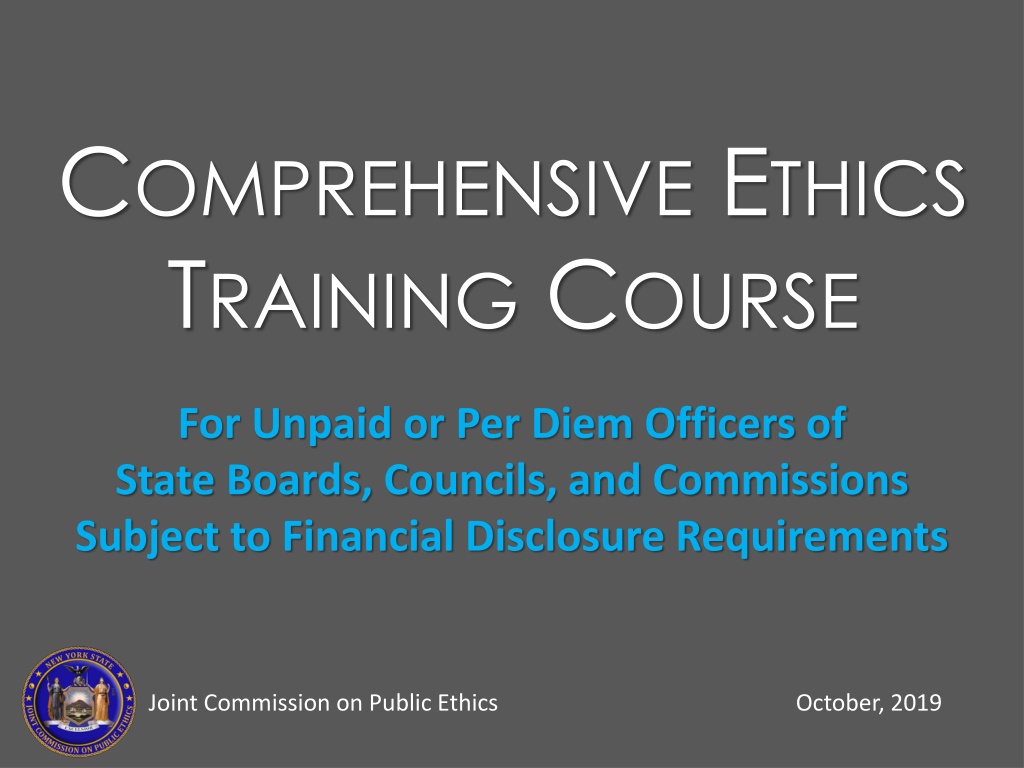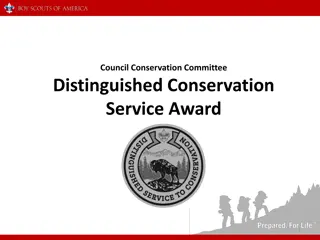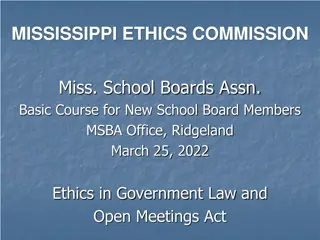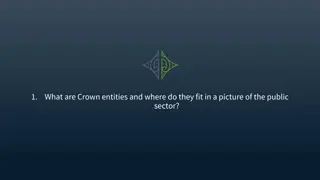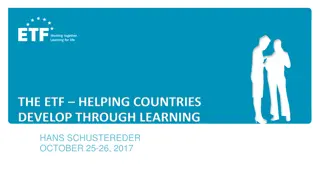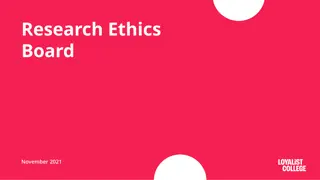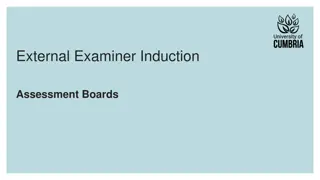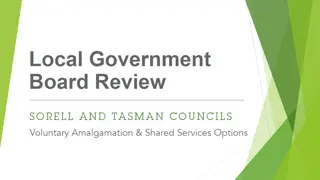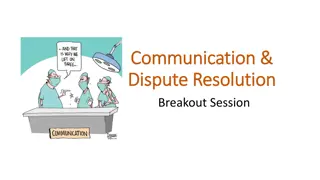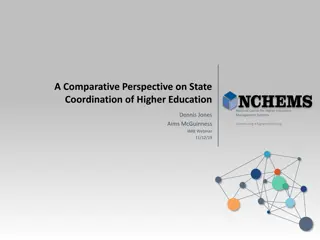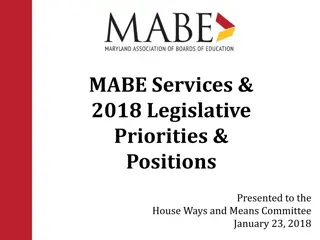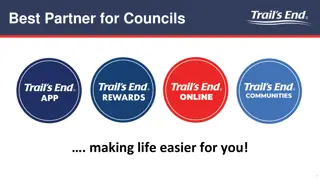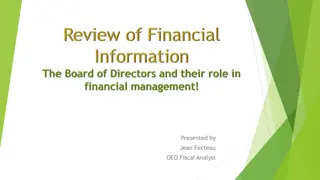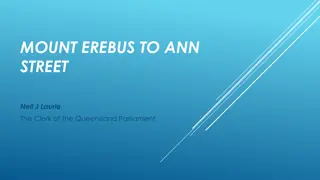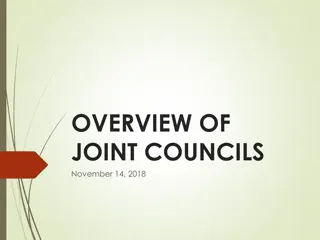Ethics Training Overview for State Boards, Councils, and Commissions
This comprehensive ethics training course is designed for volunteer unpaid or per diem officers of State Boards, Councils, and Commissions subject to financial disclosure requirements. It covers various topics such as jurisdiction, guidance, enforcement, and more to ensure compliance and prevent conflicts of interest. The training is mandated to promote public trust and educate officers on the ethics laws, regulations, and policies they must adhere to. Disclaimer: The information provided is for educational purposes only, and individuals should seek legal advice from appropriate channels for specific ethics questions.
Download Presentation

Please find below an Image/Link to download the presentation.
The content on the website is provided AS IS for your information and personal use only. It may not be sold, licensed, or shared on other websites without obtaining consent from the author. Download presentation by click this link. If you encounter any issues during the download, it is possible that the publisher has removed the file from their server.
E N D
Presentation Transcript
COMPREHENSIVE ETHICS TRAINING COURSE For Unpaid or Per Diem Officers of State Boards, Councils, and Commissions Subject to Financial Disclosure Requirements Joint Commission on Public Ethics October, 2019
Disclaimer This mandatory Ethics Training is an overview of provisions of law that apply to FDS Filers, focusing specifically on those applicable to volunteer unpaid or per diem officers of State Boards, Councils, and Commissions. It is NOT INTENDED for FDS Filers who are also paid employees of the State. Note: a State agency or entity may adopt its own ethics regulations and policies that are more restrictive than those covered in this course. The information included in this training is for educational purposes only and not for the purpose of providing legal advice. You should contact your agency scounsel s office or JCOPE s legal staff to obtain advice related to a particular ethics question. For your information, all applicable ethics laws, regulations, advisory opinions, policies, and guidance documents within JCOPE s jurisdiction are set forth in their entirety at www.jcope.ny.gov.
Purpose of Ethics Training Prevention Compliance Awareness Regular ethics training is mandated by the Executive Law and promotes public trust. Educate State Officers on the ethics laws, regulations, and policies they are obligated to follow. Prevent both actual and apparent conflicts of interest between official duties and private interests.
CETC Topic Overview Jurisdiction Guidance Enforcement Training JCOPE Overview Overview Deadlines Privacy concerns Extensions Financial Disclosure The Code of Ethics Standards of Conduct Reverse two-year bar Negotiation of future employment Public Officers Law 74 Civil Service Law Politics in the workplace 107
JCOPE Overview
JCOPE Jurisdiction The Public Integrity Reform Act of 2011 (PIRA) established the Joint Commission on Public Ethics (JCOPE) and expanded its jurisdiction to include: Executive branch officers and employees, including SUNY and CUNY employees Four Statewide Elected Officials and candidates for those offices Members of the Legislature and candidates for those offices Legislative employees Lobbyists, Clients, and Public Corporations (as defined in the LobbyingAct ) Political Party Chairpersons
Core Functions of JCOPE Investigation and Enforcement Advice and Guidance Training and Education Ethics and Lobbying Disclosure
ADVICEAND GUIDANCE
Need Ethics Advice or Guidance? Call: 1-800-87-ETHICS (800-873-8442) Press 2 for Attorney of the Day JCOPE legal staff is available to address your questions about how ethics laws and regulations apply to your circumstances.
How is Advice and Guidance Provided? Informal Opinion Formal Opinion Confidential Public document Based on precedent Sets precedent Issued by JCOPE Commissioners Issued by staff attorneys
INVESTIGATIONAND ENFORCEMENT
What You Need to Know If JCOPE is considering beginning an investigation, the subject will receive notice and an opportunity to respond. The notice is a confidential document that contains information regarding the alleged violations of law. After evidence is gathered, a confidential hearing is conducted, presided over by an independent hearing officer. The hearing officer makes his/her findings and recommendations to the Commission for final determination. Failure to answer or appear will not prevent JCOPE from proceeding with an investigation or enforcement. All communications and records related to the investigation are confidential, unless and until JCOPE issues a Substantial Basis Investigation Report.
Mandatory Ethics Training for FDS Filers Any State officer or employee required to file an annual Statement of Financial Disclosure (FDS) is required by law to complete ongoing ethics training. New FDS Filers are required to complete the OEO within three months of becoming a filer. If the CETC is completed first, the OEO is not required. Online Ethics Orientation (OEO) Comprehensive Ethics Training Course (CETC): FDS Filers are required to complete a live CETC within two years of becoming an FDS filer. Live Ethics refresher training provides an update on any changes in applicable laws, regulations, or policies. FDS Filers are required to take the JCOPE Ethics Seminar or retake the CETC every three years. Ethics Seminar/Refresher Training: Live
FINANCIAL DISCLOSURE Public Officers Law 73-a
Financial Disclosure The Financial Disclosure Statement (FDS) is a publicly available record containing financial and professional information about the FDS Filer and the filer s spouse. The purpose of the FDS is to: provide transparency prevent conflicts of interest between a person s professional duties and private financial interests and affiliations
Who is Required to File? Officers, members, directors, and employees of any State agency, board, commission, council, public authority, public benefit corporation, or legislative employees who are: Threshold Filers (State employees who have an annual salary in excess of the filing threshold) Designated as Policymakers The four Statewide Elected Officials, Legislators, and candidates for those offices Political Party Chairpersons as defined in POL 73(k)
What is Disclosed? Offices or any positions of authority held in a business entity or organization, political party, or political organization Ownership affiliation with any business entity or professional Ownership and income from financial interests, investments, securities, real property, and other assets Debts, liens, mortgages, and other financial obligations Certain gifts, honoraria, and other payments
Things to Consider in Financial Disclosure Private sector individuals serving on State Boards may have more complicated financial circumstances to report than many State employees. If you are uncertain about how to respond to any questions on your annual FDS, please contact JCOPE and ask to speak to a Filing Specialist.
When is the Annual Filing Deadline? May 15th Statewide elected officials, State officers, political party chairs, Policymakers, and State employees with an annual salary rate in excess of the job rate of a CSEA equivalent SG-24. This is also the deadline if you want to request an extension for filing an FDS. Individuals who qualify for filing after May 15th have 30 days to file.
Privacy Concerns What you should know JCOPE automatically redacts the name of any minor child from the copy of the FDS that is made publicly available. Home addresses for paper filers are requested by JCOPE for identification purposes only and are redacted for public inspection. For FDS questions related to real property, you may disclose the general location of any investment property you or your spouse may own, including street name and locality. You do not have to identify the house or apartment number.
Options Available Regarding Disclosure A Policymaker (FDS Filer) can make a request to: o Receive an extension of time to file an FDS on the basis of justifiable cause or undue hardship o Redact responses to questions from the copy made publicly available o Not answer specific questions on the FDS regarding a spouse or minor child These requests are granted under limited circumstances
What If I Dont File on Time? If you fail to file your FDS, or if you file a deficient FDS by either not answering a question or failing to respond to a question with the required specificity, JCOPE will notify you. If you fail to respond, JCOPE will send you and your appointing authority a Notice of Delinquency that advises you of fees and penalties. Notices of Delinquency are publicly available on the JCOPE website. If you still fail to file your FDS, you may be subject to a civil penalty of up to $40,000 after a hearing, or criminal prosecution.
THE CODEOF ETHICS Public Officers Law 74
What is the Code of Ethics? The Code of Ethics Is intended to prevent you from using your official position or authority to benefit yourself or someone else Addresses actual conflicts of interest, as well as the appearance of a conflict, when performing your State duties The Code of Ethics embodies the guiding principles of: Stewardship of State Resources Impartiality Integrity Confidentiality
To Whom Does it Apply? The Code of Ethics applies toallofficers and employees of New York State, including: Legislative members and employees Officers and employees of any State agency, department, division, board, commission, or any public benefit corporation or public authority, including unpaid and per diem officers and members. Officers or employees of specific closely affiliated corporations: Youth Research Foundation for Mental Hygiene, Inc., Health Research Inc., The Research Foundation of the State University of New York, and Welfare Research Inc. Inc., The Research
The General Rule: Public Officers Law 74(2) New York State officers and employees, members of the Legislature or legislative employees shall not have any interest, financial or otherwise, direct or indirect, or engage in any business or transaction or professional activity or incur any obligation of any nature, which is in substantial conflict with the proper discharge of his (or her) duties in the public interest.
Civil Penalty Amount Violations of the Standards of Conduct may result in a civil penalty of up to $10,000 and the value of any gift, compensation, or benefit received as a result of the violation. In addition to civil penalties, each agency is empowered to impose disciplinary actions, which may include fines, wage garnishment, or termination.
STANDARDSOF CONDUCT
Impartiality Standard Standard A You employment that will impair your independence of judgment when performing your State duties. cannot accept outside You serve on a board that oversees a contract with a private sector vendor. As a representative of the State, you are responsible for making sure the vendor is adhering to your board s contract. The vendor offers you a part-time position as a consultant on a completely different project that does not involve your board. Can you pursue this outside employment?
Confidentiality Standards Standard B You cannot accept employment or engage in any business or professional activity which will require you to disclose confidential information that you have gained as a result of your State position. Standard C You cannot disclose confidential information you have gained as a result of your State position to benefit either yourself or someone else. Talk to your Ethics Officer to determine what information is confidential according to your State position.
Unwarranted Privileges Standard D You cannot use your official position to obtain privileges or exemptions for yourself, including using State resources for your private business or other paid, non-governmental purposes. You are a member of the State Board of Elections. Professionally, you also have your own desktop publishing business. You may not use the Board s scanners, printers, computers and technical software to perform services for your clients, even if you bring your own paper and ink, and do this private work after hours.
Financial Conflicts Standard E You transaction as a representative of the State with a business entity in which you may have a direct or indirect financial interest that conflicts with the proper discharge of your official duties. cannot participate in a You serve as a member of the Council on the Arts, which considers grants to arts organizations. You may not participate in a vote to offer a grant for a performing arts venue where your spouse works.
Financial Conflicts Standard G You must abstain from making personal investments in enterprises that you have reason to believe may be directly involved in workplace decisions you may make which would create a substantial conflict between your duty in the public interest and your private interest. You serve as a Commissioner on the Gaming Commission, which oversees casinos. You are also part-owner of a local craft brewery that is seeking a contract to provide their product to a restaurant that is located within a casino. You must recuse yourself from Commission business involving this casino and recuse yourself from decisions regarding this contract by the brewery to remedy this conflict of interest.
Financial Conflicts: Recusal Recusal means to remove oneself from participation (including discussions, deliberations, and votes) to avoid a conflict of interest. Even the appearance of a conflict of interest might be enough to trigger the need for you to recuse yourself from actions taken as a State official. There are times, however, when recusal is not enough of a remedy. Consult with your agency s Ethics Officer or reach out to JCOPE s Attorney of the Day for confidential guidance on potential recusals.
Financial Conflicts: Recusal Example Advisory Opinion No. 03-09 County Soil and Water Conservation Districts (SWCDs) seek grant funding from a State Committee on Soil and Water. In this opinion, JCOPE required a voting member of the State Committee to disclose that he was also a SWCD board member, and to recuse himself from any vote involving a grant application from a SWCD on whose board he served. In the opinion, JCOPE recognized that the Committee s enabling legislation contemplated voting members being individuals with expertise and interest in County conservation issues. The Commission also noted, however, that a member's judgment could be affected if he were called on to vote on a grant application in which he has a direct interest. Moreover, the public might well perceive favoritism in such circumstances even if none actually existed.
Recusal: Things to Consider What if my recusal does not permit my board/commission to reach a quorum? whether . . . recusals pose an operational problem is [ ] not for the Commission to determine. The Commission has previously held that the determination of whether and when recusals reach an unacceptable level is for the State agency to make.
Contracting Goods & Services Standard I You, or any entity you are a member of, or any corporation that you own substantial stock in, cannot sell goods or services to entities that are licensed or regulated by your agency. You may also be prohibited from holding an outside job with any such licensed or regulated entity. (See Advisory Opinion No. 99-08) Example: You are member of the Hospital Review and Planning Council of the Department of Health. Acme Hospital is regulated by your agency. You or business entities you are affiliated with are prohibited from selling goods or services to Acme Hospital.
Integrity Standards Standard F You must avoid situations that may create an appearance that you could be improperly influenced in the performance of your State duties. Standard H You should always conduct yourself in such a way that it will not appear to a member of the public that you are involved in a form of misconduct and are violating the public s trust. Ethics is in the eye of the beholder. Ask yourself if the situation or circumstance you may be involved in could be turned into a negative news headline. How would a member of the public perceive your behavior?
EMPLOYMENT RESTRICTIONSINSTATE SERVICE Other Applications of 74
REVERSE TWO-YEAR BAR
Reverse Two-Year Bar This rule may require you to recuse yourself from involving your former and current private business relationships. matters directly It prevents the appearance that you may give preferential treatment to - or be unduly influenced by - these private interests. Whether a conflict of interest results from a Board member s private- sector connections must be determined on a case-by-case basis. However, certain factors are considered in reaching such a determination.
Reverse Two-Year Bar: Recusal Considerations AO 94-11 The requesting party was a member of a State Board responsible for acting on funding applications for two major programs. The requesting party asked: 1. May a Board member who had left a private employer one and one-half years ago consider a grant proposal submitted by that former employer? 2. If the Board member ended representation of a client six months ago and does not currently conduct business with the client, is there a conflict if the Board member acts on the former client's proposal?
Reverse Two-year Bar: Recusal Considerations The Commission adopts a presumption that action by a member of a board concerning a former employer or business that he or she left within the last two years is a violation of 74. Such a presumption could be rebutted by looking at other factors, including: whether the board member was in an employment relationship with the applicant, which implies daily oversight and control, or was in a consulting relationship, which suggests a more temporary connection; whether the board member was an officer or senior official of the applicant; whether the board member or the applicant had a fiduciary relationship with the other; whether the applicant is the actual former employer or business entity with which the board member had the relationship or whether it is a related, subsidiary, or umbrella organization; and for how long the relationship existed.
NEGOTIATIONOF FUTURE EMPLOYMENT
Unsolicited and Solicited Job Offers As a State officer, there are restrictions on if and when you may negotiate future employment with an entity or individual that has a specific matter pending before you. If you receive an unsolicited job offer, or if you are interested in soliciting an employment opportunity, you may only pursue an opportunity after yourself from the matter. employment fully recusing
Restrictions on Political Outside Activities Policymakers, including those in an unpaid or per diem position, are prohibited from serving as: an officer of any political party or political organization; and a member of any political party committee. For example, serving as a political party district leader or a member of the national committee of a political party. 19 NYCRR Part 932.4
Codes of Ethical Conduct Boards, commissions, corporations whose members, directors or officers are subject to 73-a of the Public Officers Law and are not subject to 73 of such law by virtue of their uncompensated or per diem compensation status, shall adopt a code of ethical conduct covering conflicts of interest and business and professional activities, including outside activities. councils, public public authorities, benefit and 19 NYCRR Part 932.9
LITTLE HATCH ACT CIVIL SERVICE LAW 107
